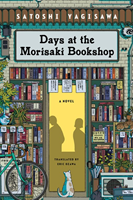Days at the Morisaki Bookshop
July 07, 2023
There are many love letters to books out there, but what Satoshi Yagisawa celebrates in this novel is not just books themselves, but how books can transform us.
 Days at the Morisaki Bookshop: A Novel by Satoshi Yagisawa, translated by Eric Ozawa, Harper Perennial
Days at the Morisaki Bookshop: A Novel by Satoshi Yagisawa, translated by Eric Ozawa, Harper Perennial
This summer, my attention has flickered like the tail end of a firefly. Camped out between my air conditioner and my air purifier, all I’ve craved during these hot and hazy days are books that can transport me elsewhere, preferably in a short amount of time. I found just the thing with Satoshi Yagisawa’s award-winning novel, Days at the Morisaki Bookshop.
Initially published in Japan in 2010 and recently translated to English by Eric Ozawa, the story follows 25-year-old Takako, who finds herself unmoored after being unceremoniously dumped by her two-timing boyfriend and coworker, Hideaki. Struggling to cope with her heartbreak, she quits her job and sleeps the days away until, seemingly out of the blue, she receives a phone call from her uncle Satoru. An eccentric man and the third-generation owner of a secondhand bookshop in the Tokyo neighborhood of Jimbocho, Satoru invites Takako to live rent-free in a room above the shop in exchange for her help behind the counter.
Initially withdrawn and reluctant to engage with her new surroundings, Takako soon discovers a passion for modern Japanese literature. After staying up all night reading her first novel in the musty room above the bookshop, Takako finds herself unable to properly encapsulate the euphoric feeling that sets in after reading a good book.
“Yeah, it was amazing,” I said. “I don’t know how to describe it. It hit home.” I was frustrated that I couldn’t come up with a better word. “It hit home” couldn’t begin to describe the complex things happening inside me.
And through their newfound shared love of literature, Takako and Satoru form a powerful bond.
We talked about the book for a while. It was a joy to feel connected to someone I’d felt I had so little in common with. It thrilled me even if it was just with someone like my uncle—no, it thrilled me even more because it was someone like him.
Feeling joy for life again, Takako quickly connects with the shop’s customers and starts befriending the equally book-enamored regulars at the nearby coffee shop. She delights in the small details of her new home and her steady transformation. She empathizes with and appreciates her uncle, whose journey from teenage depression to youthful wanderlust to restored interest in the family bookshop mirrors her own. When figures from Takako’s and Satoru’s pasts suddenly re-emerge, they hold fast to each other as they navigate the upheaval of past heartbreaks and new beginnings.
Yagisawa’s novel is impressive in how it builds out such a tangible world and a lovable cast of characters in just under 150 pages. And yet, that vivid setting acts not as the destination but as a conduit towards something more transcendent. Following Takako, I was transported through past eras of my own life. I revisited memories of experiencing heartbreak, the simple joys of passing the days behind the counter of a mom-and-pop shop, rediscovering a love for books, and finding my place in the world again. I felt it impossible not to be engulfed by emotions while reading this book—sadness, longing, happiness, comfort, wonder, and beyond, all blended into something indescribable. In Takako’s words, “It hit home.”
Just as Takako opens her heart to the world again after her time at the Morisaki Bookshop, I realize that this is indeed what a good book does—it opens a person up. It’s easy to think of reading as a solitary activity, when in fact, it’s one of the most reliable sources of connection we have. We connect to the author through their thoughts. We connect to the editors, translators, and publishers who help put these thoughts to paper. We connect across time to the strangers who owned a book before us who, as Takako notes, were moved to highlight the same passages that moved us too. And we connect to our community, whether through a shared love of books or through the empathy and curiosity that books foster within us.
There are many love letters to books out there, but what Yagisawa celebrates in Days at the Morisaki Bookshop is not just books themselves, but how books can transform us.



